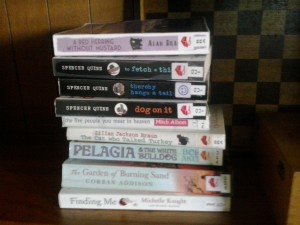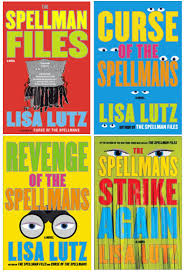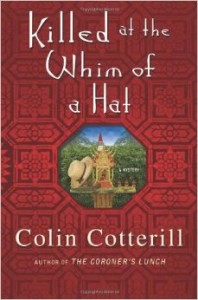I fully admit that I’m a poor excuse for a blogger. Nearly three months you’ve been sitting at your computers clicking ‘refresh’ waiting for a new post and all the while I’ve just been lazing around digging the garden and painting the fence and birthing the lambs (well, watching and applauding really) and clear felling the lawn from six months of neglect and, you know, stuff. Other stuff is on the horizon – word on the street is that there are only 8 Fridays until Christmas – and a whingey pathetic drizzle has put an end to today’s outdoor activities so I thought I’d take advantage of the lull to help you prepare for your summer of relaxation by telling you what to read.
I don’t get to the library often – you can read about that here – so when I do I try to make the most of it by getting lots of really good books and in particular by trying to make myself be all brave and adventurous and get new ones that I don’t already know and love. Familiar books are like a warm fluffy blanket and a cup of hot Milo on a cold day and the temptation is to make my way to the same old ones every time. I’ve made a big effort to be strong and resist, and as a result I’ve now got a crop of new ones that I know and love and am not going to be able to let myself have again for ages. So worth it.
Disclaimer: I really only pick books from the eye-level shelves. At a pinch I’ll get down to waist height but any lower than that just isn’t how I roll. Also everything from about T onwards is on a different shelf too far from the kiddie area for me to get to without some sort of embarrassing scene happening in my absence so if you’re looking for a well-rounded critique of the current literary scene involving the whole alphabet you’re gonna need to find another blog.
So let me introduce you to this lovely series:
There are, I believe, 7 books about the fascinating Flavia de Luce and a television series going into production. I might have to BitTorrent that because I can imagine it being gorgeous.
Flavia lives with her fond but vaguely neglectful father and two fairly vicious older sisters (with hints of a backstory not yet told, at least as far as I’ve got, to explain their animosity) in a crumbling mansion in the tiny English village of Bishop’s Lacey in 1950. Her mother, who drove a Rolls-Royce Phantom and flew a de Havilland Gypsy Moth for fun, died falling off a mountain in Tibet when Flavia was a baby (hints of another possible backstory. Or maybe the same one). Flavia is a young lady of resourcefulness and spirit, however, and despite the lack of familial warmth and nurturing does very well for herself thank you very much. Her passion is chemistry, deadly poisons in particular, and she spends all her spare time in a laboratory left by one of her ancestors experimenting with all manner of things, aided and abetted by her father’s somewhat shell-shocked former army buddy and current manservant, Dogger.
Despite being tiny Bishop’s Lacey proves to be the usual seething hotbed of ancient grudges, unrequited passion, war secrets and greed, and so murders ensue. Although the local constabulary occasionally, as Flavia has to admit, end up on the right track somehow, her own quick mind and knowledge of all things scientific make her really quite indispensable when it comes to unravelling the mysteries (although strangely enough, said local constabulary doesn’t always feel the same way).
The author, Alan Bradley, grew up immersed in stories of English village life and always wanted to write novels in this setting. Obviously I wouldn’t know whether he’s got all the details right or not but from the way he creates the atmosphere around the time and place I suspect that he has. Flavia herself, narrating adult events and motives through eleven-year-old eyes, is unintentionally amusing and frequently reveals more than she knows. Using a precocious child as the protagonist could end up with an insufferable, pompous main character but I’d say Mr Bradley really knows what he’s doing because he manages to make Flavia appealing and amusing without downplaying her formidable intellect. Unfortunately for me our library does not seem to believe in buying the whole series – or indeed, in not getting rid of random books from series it does have – so I’m not sure whether I’ll be following Flavia beyond book 4. Perhaps I can catch her on t.v.
Speaking of incomplete series, I also thoroughly recommend this one (try not to be put off by the cover art. My library has nicer ones):
Isabel Spellman, former wild-child and scourge of the neighbourhood, works as a private investigator. She has to really because her home doubles as the headquarters for Spellman Investigations, the PI firm her parents have run since before she was born. Isabel started working for the family business when she was 12; her younger sister Rae was allowed to start earlier because her parents couldn’t break her covert surveillance habit so they decided to channel it instead. The older brother was a great disappointment to the family: with his belief that people have a right to privacy, among other things, he lacked the necessarily flexible moral code to make it as a spy and had to become a lawyer instead.
What would it be like to grow up in a family where in-depth background checks on boyfriends, following each other around, staging drug deals and abductions to get people to do what you want and going to impossible lengths to keep a secret are just normal everyday activities? Well, you’d end up like Isabel. Or Rae.
Isabel has some good skills but an even better talent for messing up, especially when it comes to her love-life. Rae is a spying prodigy but isn’t old enough to drive and has developed an obsession with the policeman she met on an early case. Their parents – the ‘Parental Unit’ – are busy with their own cases, trying to keep Isabel on the straight and narrow, retrieving Uncle Ray from his periodic Lost Weekends, and reigning Rae in to at least a pretence of a normal adolescent life. Again, author Lisa Lutz totally knows what she’s doing. She has written quirky, funny characters and outlandish scenarios to be completely plausible and I JUST WISH I COULD READ THE REST OF THE SERIES!
And then:
Carrying on with the theme of mysteries narrated by unusual characters, meet Bernie and Chet by Spencer Quinn. Bernie’s a PI (America seems to need a lot of them) and Chet’s his trusty hound – and the narrator. Like Isabel, Bernie has mad skillz and an even madder ability to make bad decisions, particularly in regard to the opposite sex. Chet, a trained police dog who never quite got his certificate on account of an unfortunate incident at obedience school (a cat was involved), is pretty smart and resourceful himself. The beauty of this series (and again, how would I know because I’M ONLY ALLOWED THE FIRST THREE), is in the author’s ability to be convincing writing as a dog. There are gaps in Chet’s knowledge for very dogly reasons: sometimes he’s not big enough to see what’s going on. Sometimes he can’t understand why humans would possibly do such a thing when dogs would be way more sensible. Sometimes he’s distracted from important events by even more important she-dog calls or glimpses of something chase-worthy. And often it just seems like a great time for a nap.
A book on its own now (so ha ha library – can’t frustrate me with this one!):
I didn’t realise until later that Matthew Quick’s first book, The Silver Linings Playbook, is one that lots of people have heard of (probably because it was made into a movie) and therefore his second, The Good Luck Of Right Now, also in movie production, is one of those eagerly awaited second novels that lots of people might eventually hear of. It was just my token nod to the Q shelf. All the eagerly-awaiting people didn’t seem to like it as much as the first book but I’ve never read that and had no expectations at all and I like it just fine.
Yet another unusual narrator. Either I’m on a roll or there’s no such thing as a usual one. Bartholomew Neil’s mother has died and he’s trying to piece things together to create a life without her. This eventually requires an alter-ego, a drunken priest who’s defrocked himself and moved in, a counsellor in an abusive relationship and a damaged brother and sister pair who, despite their terror of a repeat alien abduction, are working their way towards their goal of visiting Cat Parliament in Canada.
This is a gentle book about growth and healing and community in unexpected places. The character of Bartholomew is autistic (or similar – it’s implied rather than addressed) and once again the author is skilful enough to write in what, to me at least, has the sound of a true voice for him.
And then:
Barbara Kingsolver. You know she’s got the goods, and this time they’re packaged in a less dense and esoteric form than some of her earlier novels. Pigs In Heaven is a far easier read than, say, Animal Dreams or Prodigal Summer (and I’m still working up to The Lacuna), but with all the depth and pathos you’d expect from the master storyteller that she is. I’ve always got time for Flight Behaviour too.
In case we’re getting a bit complacent with all this light entertainment, I give you:
Half of a Yellow Sun. Historical fiction following several branches of a Nigerian family through the short, turbulent rise and fall of the nation of Biafra, this has the ring of truth which comes from a writer who’s telling her own story. Chimamanda Ngozi Adichie lost both of her grandfathers in the civil war and has a strong conviction about Africans telling the stories of Africa. Not an easy read necessarily, but compelling.
Telegraph Avenue, by Michael Chabon.
Too many words. But you might like it.
I’ve written about Colin Cotterill’s Dr Siri series before and I’m happy to announce that his other books are well worth a read too. I have to admit that despite my resolution about new and different books I couldn’t keep my hands off this old favourite. Funny, funny, funny.
Skulduggery Pleasant for grown-ups:
This also is the first of a series but I’ve thwarted the library’s evil plan to annoy me by not wanting to read the rest, at least just yet. This is not to say that no.1 here isn’t worth a look; I think it is. It’s funny and original and I’m sure I’ll look for the next one eventually.
And finally…
This one is something special in my humble opinion. As it turns out it has a prequel, The Mesmerist, but it didn’t matter at all that I hadn’t read that first because the story is complete in itself and I eventually found out everything from the first instalment that I needed to know. I’m not usually one for period drama – I just end up feeling too encumbered by all the petticoats – but I’m glad I made the effort here. It’s different and magical and even has a happy ending. I suppose I could get really crazy and read some of the many other books by Barbara Ewing. I might even find a whole new shelf that I have to ban myself from.











